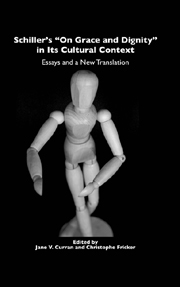Book contents
- Frontmatter
- Contents
- Acknowledgments
- Notes on References and List of Abbreviations
- Introduction
- The Cultural Context
- Schiller's Essay “Über Anmut und Würde” as Rhetorical Philosophy
- Schiller as Citizen of His Time
- Sensuous-Objective: Beauty in the Realm of Human Freedom: On the Language of Concepts in Schiller's Essay “On Grace and Dignity”
- From Romantic Dream to Idyllic Tragedy: Idealism and Realism in Schiller's Dramas, Before and After Kant
- The Poet as Herald of Grace and Dignity: The Influence of Schiller's Twin Concepts on Stefan George
- The Text
- Notes on the Contributors
- Index
The Poet as Herald of Grace and Dignity: The Influence of Schiller's Twin Concepts on Stefan George
from The Cultural Context
Published online by Cambridge University Press: 05 February 2013
- Frontmatter
- Contents
- Acknowledgments
- Notes on References and List of Abbreviations
- Introduction
- The Cultural Context
- Schiller's Essay “Über Anmut und Würde” as Rhetorical Philosophy
- Schiller as Citizen of His Time
- Sensuous-Objective: Beauty in the Realm of Human Freedom: On the Language of Concepts in Schiller's Essay “On Grace and Dignity”
- From Romantic Dream to Idyllic Tragedy: Idealism and Realism in Schiller's Dramas, Before and After Kant
- The Poet as Herald of Grace and Dignity: The Influence of Schiller's Twin Concepts on Stefan George
- The Text
- Notes on the Contributors
- Index
Summary
Happiness may be all in the mind, but it is also found in the constitution of people who show forth grace and dignity: “Laß [die Schönheit] die Glückliche sein, du schaust sie, du bist der Beglückte” (let [beauty] be happy; if you see it, you are the happy one), says Schiller in the poem “Das Glück” (Happiness). And a little further on he says about the person listening to a singer inspired by God: “Weil er glücklich ist, kannst du der Selige sein” (both quotations NA 1:410; Because he is happy, you can be overjoyed). Schiller's transcendental philosophy is constantly linked with phenomena, what can be seen. Despite all attempts at conceptual clarity, there is no concealing the fact that his thoughts about grace and dignity appeal to the senses. The law of beauty is a point of orientation in a world perceived by the senses. Humans acknowledge a limit to their abilities: they know that they are responsible for the law according to which grace and dignity are manifested, but also that they cannot themselves produce them in accordance with that law.
In what follows I intend to show how Schiller moves from thoughts about individual receptivity to grace and dignity to adopt a broader social and finally historical-philosophical perspective. The role of those endowed with particularly sharp senses will have to be examined. The second stage will show how this dynamic is received in a later period. For this, I will use Stefan George as an example.
- Type
- Chapter
- Information
- Schiller's 'On Grace and Dignity' in its Cultural ContextEssays and a New Translation, pp. 105 - 120Publisher: Boydell & BrewerPrint publication year: 2005

